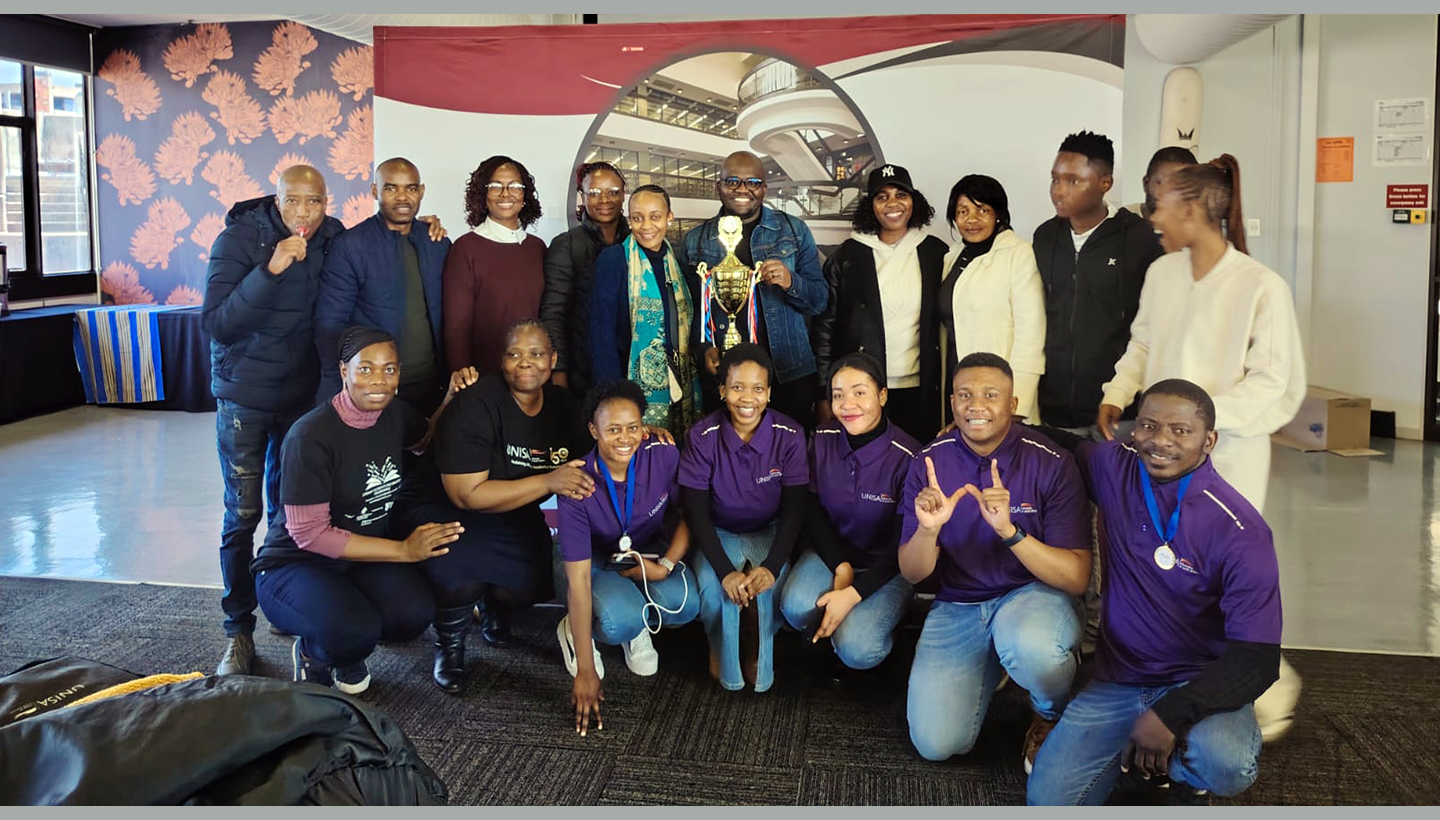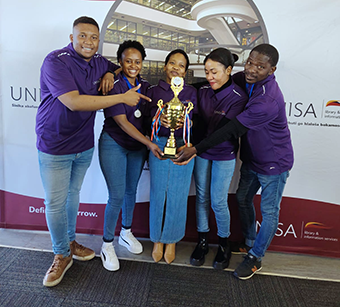News & Events
Unisa's book boffins clinch debate victory over UJ

Members of the Unisa LIS Book Club
The Unisa Library and Information Services (LIS) Book Club claimed top honours in a spirited debate against the University of Johannesburg’s (UJ) Library Book Club on 8 August 2025, winning under the theme “The Societal Impact of Artificial Intelligence and Robotics”.

The Unisa debate team, from left: Sibani Zungu, Mashudu Ravele, Boitumelo Thubane, Chimangadzo Lambani, and Thamsanqa Nkuna
Organised by the Literary Outreach Incubation Programme, in partnership with the Department of Arts and Culture and Kwetso Consulting, the event was hosted by UJ at its Auckland Park campus. It brought together young thinkers to tackle some of the most urgent questions shaping the 21st century.
Kwetso Consulting’s Director Kate Lengwasa opened the proceedings by highlighting the importance of informed dialogue. “This is a phenomenon that we are very enthusiastic about,” she said, “Knowledge is everything”. She thanked the Department of Arts and Culture for supporting the programme's vision of fostering debate as a learning tool.
From the outset, Unisa’s five-member team demonstrated sharp analysis and confident delivery. The Unisa LIS Book Club Chairperson, Boitumelo Thubane, asked a provocative opening question: "Are humans gradually rendered obsolete by AI and the robust technological emergence of robotics? Or is this just a myth?” Dr Matlala Mahlatsi, a Department of Information Science lecturer, later commented that Thubane’s delivery had “paralysed the opposition”.
Mashudu Ravele, who was placed second in the individual rankings, called for taking the initiative to prepare for technological change. “We must prioritise skills development, using AI itself to empower people,” she said.
Chimangadzo Lambani addressed misconceptions: “Let us look at AI with facts, not fears. AI is not eliminating work; it is transforming work.”
Sibani Zungu tackled the economic debate over a basic income grant, urging focus on “reskilling, re-education, digital literacy, entrepreneurship and training for the use of AI”.
The UJ debaters brought equally thought-provoking counterarguments, questioning the feasibility of large-scale retraining and highlighting the risks of AI adoption in countries with limited infrastructure. Their ability to challenge and probe the Unisa debaters’ positions kept the contest competitive to the end.
Also in attendance was the Tshwane University of Technology Library Book Club, whose members enthusiastically engaged with the audience, adding to the lively exchange of ideas and networking opportunities.
The Unisa team secured five of the top six individual positions when the results were announced. Thamsanqa Nkuna, who was named Best Speaker of the Day, concluded with a forward-looking message: “We live in the 21st century, and it means technology is for us whether we like it or not. This is the Fourth Industrial Revolution – the future is here, and we are the future.”
As last year's champions, the UJ team warmly congratulated the Unisa team, reflecting the spirit of mutual respect that defined the afternoon. Theodorah Modise, the event coordinator at UJ, congratulated the Unisa team, saying it was a well-deserved win.
Professor Mpho Ngoepe, Executive Director of Unisa LIS, expressed pride in the team’s achievement: “Congratulations, Unisa LIS Book Club – a bunch of readers and winners!”
The event closed with refreshments and conversation, celebrating the results and the shared commitment to critical thinking, collaboration, and informed public discourse qualities that are essential as technology continues to shape work, education and society.
* By Itumeleng Mpete, Marketing Coordinator, Library and Information Services
Publish date: 2025-08-18 00:00:00.0

